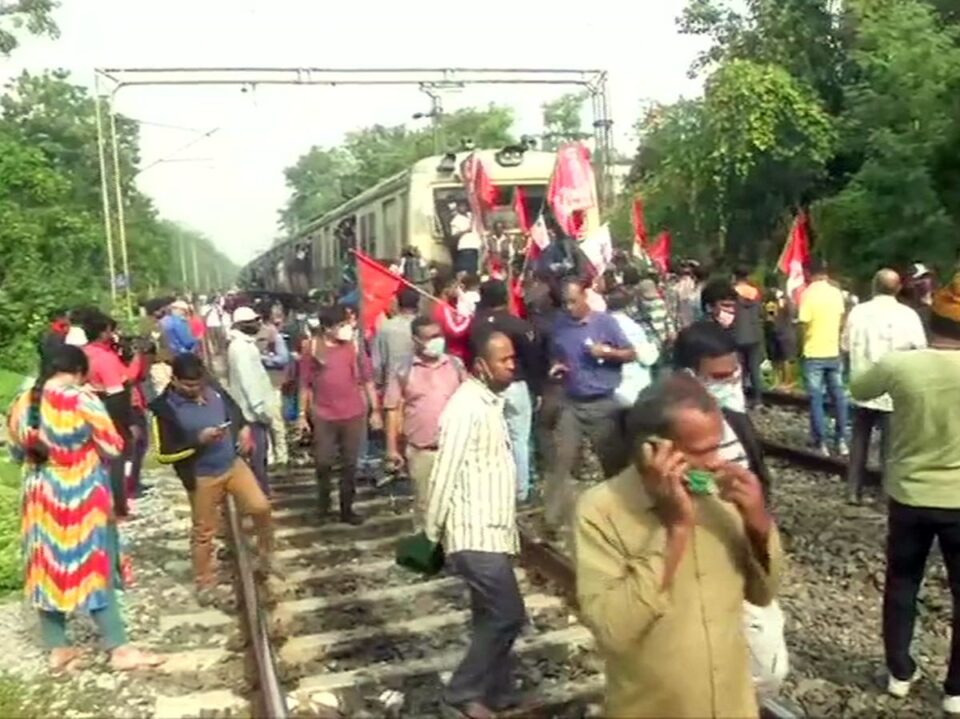Public services are likely to be affected as central trade unions began a nationwide strike on Thursday, with a union representative saying that Tamil Nadu and Kerala have been affected the most so far due to the agitation.
IMAGE: Agitators block railway track in Jadavpur as trade unions observe nationwide strike against various policies of the government. Photograph: ANI
A day-long strike has been called for by a joint platform of ten central trade unions, including Indian National Trade Union Congress, All India Trade Union Congress, Hind Mazdoor Sabha, Centre of Indian Trade Unions, All India United Trade Union Centre, Trade Union Co-ordination Centre and Self-Employed Women’s Association.
Others are All India Central Council of Trade Unions, Labour Progressive Federation and United Trade Union Congress.
Various independent federations and associations are also part of the joint platform.
They are protesting against the new farm and labour laws, among other workers-related issues, as well as to raise various demands.
“The strike has begun. Kerala and Tamil Nadu are completely shut down. Similar situation is also developing in Odisha, Punjab, Haryana, Telangana and Goa. There is also a good response to the strike in Maharashtra,” AITUC General Secretary Amarjeet Kaur said.
Bharatiya Janata Party-aligned Bharatiya Mazdoor Sangh is not participating in the strike.
Kaur informed that that the services at banks, LIC (Life Insurance Corporation), GIC (General Insurance Corporation) and the Income Tax Department are also likely to be hit severely.
“Visakhapatnam steel plant is affected due to the strike. Besides, majority of workers in coal mines are also on strike. The work at copper plants, port and dock area are also affected. Delhi industrial areas are closed down. Workers would protest at Jantar Mantar,” Kaur said.
Normal life was partially affected in parts of West Bengal on Thursday due to the nationwide strike called by several trade unions in protest against the Centre’s economic policies.
Bandh supporters, mostly activists of Communist Party of India Marxist- affiliated outfits like CITU and DYFI, brought out rallies in Jadavpur, Garia, Kamalgazi, Lake Town and Dumdum areas in and around Kolkata, disrupting vehicular movement and asking shopkeepers to pull down the shutters of their establishments, an official said.
IMAGE: Members of Odisha Nirmana Sramik Federation, All India Central Council of Trade Unions and All Orissa Petrol & Diesel Pump Workers Union hold demonstration in Bhubaneswar. Photograph: ANI
They picketed outside Howrah railway station, asking vehicle operators to stop services but a large police contingent was deployed to ensure normal plying of vehicles, he said.
Bandh enforcers also blocked roads in Coochbehar and Jhargram districts, burning tyres and breaking the windscreen of buses, the official said.
Train services were affected in Sealdah South and Main sections as agitators put logs on railway tracks, he said.
The united front of farmer organisations — AIKSCC — has also extended its support to the general strike and are mobilising their members in rural areas to express solidarity with the striking workers.
Scheme workers, domestic workers, construction workers, beedi workers, hawkers, vendors, agricultural workers, self-employed in rural and urban areas have also decided to come on to the streets for ‘chakka jam’.
In many states, auto and taxi drivers have decided to keep off the roads.
The federations of railway and defence employees have decided to have large mobilisation on Thursday to express solidarity with the striking workers.
The demands of the joint platform include cash transfer of Rs 7,500 per month tor all non-income tax paying families and 10 kilograms of free ration to every needy person per month.
The unions have also demanded expansion of MGNREGA, the rural employment guarantee scheme, to provide 200 days’ work in a year in rural areas at enhanced wages and also extension of the employment guarantee to urban areas.
They have also asked the government to withdraw all “anti-farmer laws and anti-worker labour codes and stop privatisation of public sector, including the financial sector and stop corporatisation of government-run manufacturing and service entities like railways, ordinance factories, ports etc”.
Among other demands, the unions have sought withdrawal of the “draconian circular on forced premature retirement of government and PSU employees”.
Other demands of the unions include ‘pension to all’, scrapping NPS (National Pension System) and restoration of earlier pension with improvement in EPS-95 (Employees’ Pension Scheme-1995 run by retirement fund body EPFO).




